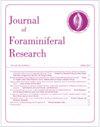基于稳定碳和氧同位素的古生态推断(Koutsoukos,2014)
IF 0.7
4区 地球科学
Q4 PALEONTOLOGY
引用次数: 0
摘要
该物种首次出现在白垩纪-古近纪(K-Pg)边界之后,被认为是所有新生代正常穿孔物种的祖先。我们提出了T.nikolasi标本的δ18O和δ13C同位素信号,并将其与圣保罗高原[深海钻探项目(DSDP)356号场地]的混合层(Guembelina cretacea)、温跃层(Subbotina trivialis和Chiloguembelina midwayensis)和具有玻璃壳保护的深水(Nuttalides truempyi)物种的同位素信号进行了比较。尼古拉轮叶藻的δ18O值与克氏轮叶藻相似,表明这两个物种共同生活在混合层中。尼古拉氏T.nikolasi的δ13C值高于所有其他浮游有孔虫物种,这可能是由于光共生体的存在,因此可能代表了已知的新生代浮游有孔虫光共生的最早记录。356号地点的Nuttalides truempyiδ13C值非常高,表明深水中的12C丰度较低,这可能与在大年前~300kyr期间,生物泵在K-Pg边界后将12C输送到海底的效率降低有关。本文章由计算机程序翻译,如有差异,请以英文原文为准。
Paleoecological Inferences for Turborotalita Nikolasi (Koutsoukos, 2014) Based on Stable Carbon and Oxygen Isotopes
The species Turborotalita nikolasi first appeared immediately after the Cretaceous-Paleogene (K-Pg) boundary and is considered the progenitor of all Cenozoic normal perforate species. We present δ18O and δ13C isotope signals of T. nikolasi specimens and compare them with those of mixed-layer (Guembelina cretacea), thermocline (Subbotina trivialis and Chiloguembelina midwayensis), and deep water (Nuttalides truempyi) species with glassy shell preservation from São Paulo Plateau [Deep Sea Drilling Project (DSDP) Site 356]. Turborotalita nikolasi δ18O values are similar to those of G. cretacea, suggesting that both species cohabited the mixed layer. Values of δ13C for T. nikolasi are higher than those of all other planktic foraminiferal species, which may have been due to the presence of photosymbionts, and thus might represent the earliest known record of photosymbiosis for Cenozoic planktic foraminifera. Nuttalides truempyi δ13C values are remarkably high at Site 356, indicating low 12C abundance in deep waters, which could be related to reduced inefficiency of the biological pump in transporting 12C to the bottom of the ocean after the K-Pg boundary during the first ∼300 kyr of the Danian.
求助全文
通过发布文献求助,成功后即可免费获取论文全文。
去求助
来源期刊
CiteScore
2.10
自引率
9.10%
发文量
32
审稿时长
>12 weeks
期刊介绍:
JFR publishes original papers of international interest dealing with the Foraminifera and allied groups of organisms. Review articles are encouraged.

 求助内容:
求助内容: 应助结果提醒方式:
应助结果提醒方式:


